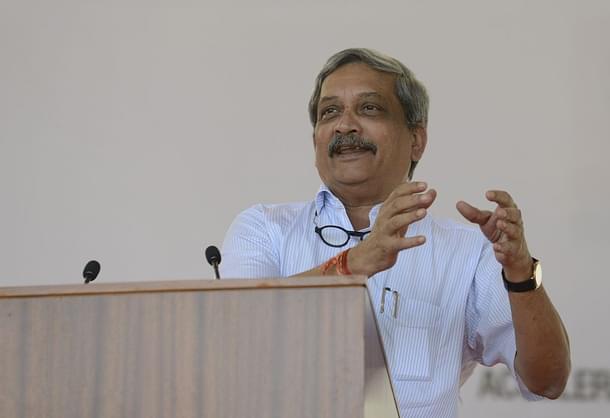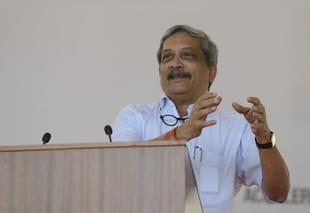Defence
No-First-Use: Parrikar Has Opened Up Strategic Space In India’s N-Doctrine
R Jagannathan
Nov 11, 2016, 12:25 PM | Updated 12:25 PM IST
Save & read from anywhere!
Bookmark stories for easy access on any device or the Swarajya app.


Defence Minister Manohar Parrikar has a way of dropping a clanger when no one is expecting it. He did it yesterday (10 November), when he made off-the-cuff remarks on India’s no-first-use (NFU nuclear doctrine. “If a written-down strategy exists or you take a stand on a nuclear aspect, I think you are actually giving away your strength in nuclear,” The Times of India quoted him as saying.
He added, for good measure: “Why should I bind myself? I should say I am a responsible nuclear power and I will not use it irresponsibly.”
Though he immediately rejected the idea that India’s nuclear doctrine had indeed changed and the Ministry of External Affairs was quick to deny any such possibility, he is surely right. And if a change is, indeed, in the offing, this is the best way to start changing it – by bringing strategic ambiguity into our nuclear posture. The actions to give effect to this shift can be done covertly.
The Indian Express brought forth more words from Parrikar and these underline the same point. He said about the nuclear doctrine, that “if I make it predictable, then I will lose the advantage of surprise. Unpredictability has to be built in your certain types of policy. You may decide for yourself, but don’t spell it out.”
He is bang on, though he repeatedly emphasised that the no-first-use (NFU) policy was not changed.
It is worth looking at the background in which India’s NFU doctrine emerged. When Atal Behari Vajpayee conducted the Pokharan 2 tests in 1998, he was aware that India faced US and global economic sanctions. That was why he immediately declared that there was no question of India using nuclear weapons first. Defence Minister George Fernandes made an additional point that India needed to go nuclear due to the regional power asymmetry that existed, and specifically mentioned China as the reason, not Pakistan. He got rapped on the knuckled for saying, for Vajpayee was keen not to anger our neighbours, but he was speaking the truth.
If a policy is cast in stone, your enemies will take that into their calculation and act accordingly. By introducing an element of unpredictability to India’s nuclear stance, wittingly or unwittingly, Parrikar has effected a shift. Even after his denial, our enemies cannot presume that this was just something said off-the-cuff, not a strategic shift in India’s stance.
In the limited context of South Asia and our neighbourhood, our logical policy should have three rungs, whether announced or unannounced.
In the case of non-nuclear neighbours (Bangladesh, in particular), we should not just talk of no-first-use, but no use (NU) under any circumstances, even if war (unlikely though it seems).
Even in the case of Pakistan, a smaller but belligerent nuclear neighbour, NFU is valid. India is the stronger and bigger power between the two, and strategic deterrence needs us to be more unpredictable in the non-nuclear side of defence and more restrained in nuclear. This is why the surgical strikes made sense, for they brought in a degree of unpredictability to our responses to Pakistani terrorism. Talking nuclear is simply not on. On the other hand, as a smaller neighbour, Pakistan can logically be expected to not accept NFU as policy. In fact, it has gone the whole hog and developed tactical nuclear weapons to deter India.
Tactical nuclear weapons are relatively useless in the India-Pakistan context as we have many populated zones nearby and any armed conflict is likely to see both armies fighting close to each other. Since tactical nukes focus over narrow areas, unless used very carefully, they could kill your own soldiers as much as those of the enemy.
Even so, India must develop tactical weapons not just to tell Pakistan “we too have it”, but because it must have deterrent value for our covertly belligerent neighbour China. We have an unresolved border dispute, and China cannot be trust to remain on the sidelines if it senses an opportunity in Tawang (where the Dalai Lama was born) or in Ladakh, where large chunks of territory already are under Chinese control. China’s passage to Gwadar in Pakistan and the China-Pakistan Economic Corridor needs China to develop strategic defence capabilities in this area, and one cannot rule out an attempt to grab some territory. Tactical nukes may well help deter here.
India’s carefully nuanced China policy must thus include possible first use of nuclear weapons, with tactical weapons being the first choice if push comes to shove.
Parrikar has done the right thing by opening up the strategic space for India in the neighbourhood. With the post-Uri “surgical strikes” India shifted from a defensive-defence posture to offensive-defence. We need to do the same in our nuclear doctrine.
Jagannathan is former Editorial Director, Swarajya. He tweets at @TheJaggi.





